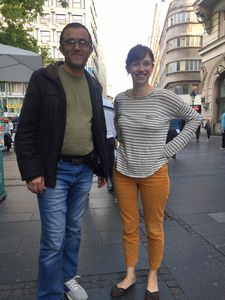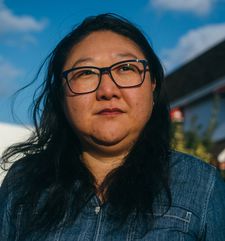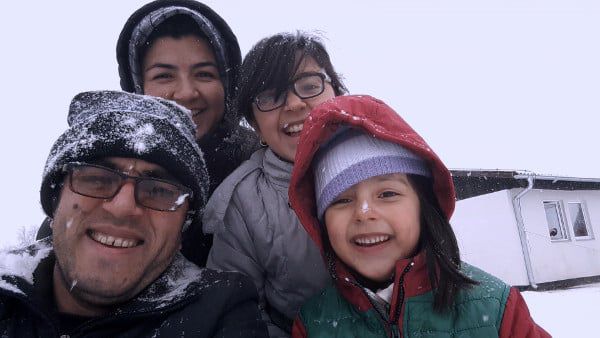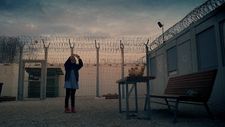Amber Wilkinson: Can you tell me a bit about how you came to be involved in the project?
Emelie Mahdavian: I already new the director. I had programmed a short of his at a festival and we'd been in contact over projects we were developing, so I was already in our lives when this was happening.
AW: And then you came in?
Su Kim: Emily was a Bay Area Video Coalition fellow and at the time, another director I worked with was in the same cohort. I just loved the film and said. I knew Emily was working predominantly on her on on the producing end, so I said: 'If I need any help, let me know'
EM: Not predominantly on my own, it was on my own.
SK: So, I said: 'Hey, I sort of know what I'm doing so I can help.'
AW: Was Hassan thinking from the very start that he was going to film this?
 |
| Hassan Fazili and producer and editor Emelie Mahdavian Photo: Navied Mahdavian |
AW: It must have been quite hard to make sure that footage was getting to you?
EM: I actually arranged contacts to meet him in different countries. I'm very lucky in that I made my first film in Tajikistan, so that one was easy. And I'm very lucky in that I have a relatively wide network from my film school, so I had friends in Turkey, Bulgaria and Serbia - friends of friends in some cases. So, he was shooting everything on to SD cards and then they would copy them on to drives.
AW:What did you think as the footage was coming in and you were watching it as it was arriving?
EM: It was always a pile of stuff that was coming at a certain delay. Because we were talking as things were happening, so I would hear about what was happening and then, however many months later - by the time that somebody had made multiple copies of drives and they had arrived - then I was able to be looking at the footage and trying to figure out what was going to work for the story as a film. That was as opposed to having been there with them talking about what was happening in real time.
AW: I was thinking that must have been quite difficult, in that you weren't in the same room and that the story was, in a sense, moving on in your absence.
EM: We had a lot of footage and by the time we had the first assembly, they were in Serbia and I went to Serbia for a month and worked with him personally. We recorded a whole bunch of audio interviews that are the basis for the voiceover - some of them actually are the voiceover in the film. So, that helped a lot. Most of the story arc was there, so we were able to assemble and I had a co-editor and advisers that would give me feedback. And that's basically how each cut progressed.
AW: I'm assuming that you must have been quite worried about them at certain stages of the trip?
EM: Very much so. There's a part of the film drop them at the side of the road and that was a very frightening thing for me as well and I was on the phone to every Bulgarian person I knew trying to find connections that would make sure they didn't get deported. There's always that problem of projecting importance and clout when you're dealing with a police system that's overburdened and individuals in that system have biases against migrants.
 |
| Producer Su Kim Photo: Jordan Edwards |
EM: The thing about it is that pressure, in some ways, comes from owing something to somebody and we didn't actually have funding from public television or any of those things come in until they were in Serbia. So, when you're thinking back to Turkey and Bulgaria, I was really pushing them not to do anything dangerous because I cared about them. If the film had not become what it became but they were safe, that was okay. I was really trying to get them to make decisions on what was best for them.
AW: That's partly why the film is so interesting, because it isn't just talking about the flight of one family, from A to B to C, it's also talking about the process of documentary making and how that effects that. Was it always your intention to have a family-based dynamic to the film?
EM: It was clear when I looked at the footage that what was strong about it was the family and the way that they had captured their lives.
SK: It was the personal story.
EM: I had a lot more footage and it could have been cut into a completely different film. Having too much footage is exhausting on your editing team because to get to the point that you've honed it to an assembly means you've watched so much that you're not that fresh any more. So, that's part of why I had my husband be my assistant editor. I let him do some of the slog, so I could stay a little fresher. I needed those other fresh eyes to help me know what was reading across cultures and things like that.
SK: It was a lot of challenges with the material but I think the story definitely triumphs.
AW:Do you hope that people will look at this film and think about the refugee situation in a different way?
SK:That's the reason we made the film to create some kind of empathy for the people are going through this.
EM: And I think by keeping a really specific story of one family, you see that the frame of the story is that this all happened because of horrific bureaucracy. They're just bureaucratic problems between asylum and refugee statuses. I think part of it is to help people wrap their heads around why someone would be in that position with their wife and their daughters.
Sometimes in America, we have people saying, 'Just don't do it. Just don't come.' I think, with them, you can see they have been backed into a corner and they've tried every option they can and this is the last thing they want to do. And, because of that, because we understand they're trying very hard and their first goal is their family's safety, it's a lot easier to then start to think in a more nuanced way about what we mean when we talk about a migrant crisis.
AW: I wonder if it helps Americans to think about it at one remove, because in this case it's the European bureaucracy that's under scrutiny rather than American bureaucracy.
EM: I kind of wonder how some Americans will respond to some of the nationalism in eastern Europe.
SK: I think what does come through is that this is a normal family, who you can relate to and who is going through something really trying and difficult. I think if you can view it from that lens, that it's a story about a family and they're really going through the worst thing you can possibly imagine going through, then I think everything else will give it context in a way you can understand. It's very relatable as a family.
Midnight Traveler screens at Doc/Fest on June 8 and June 11. It's due for release in the US this September.























